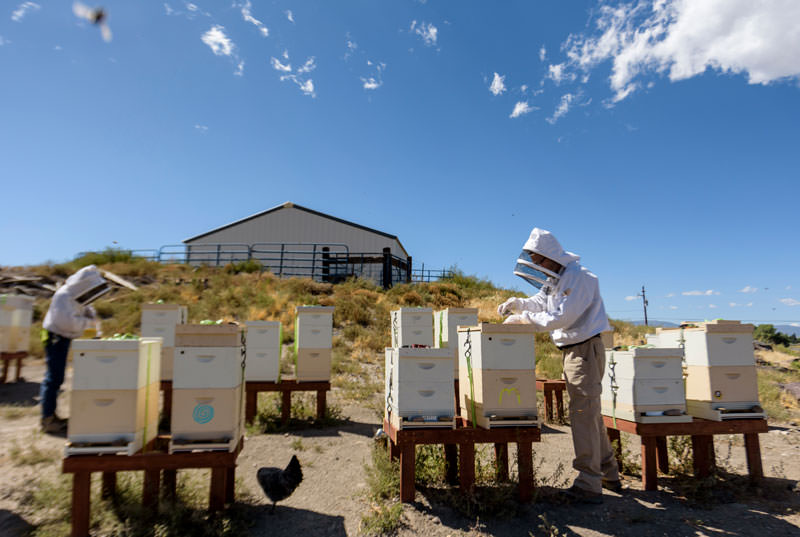Nonprofit brings beekeeping to vets suffering from PTSD.
“It was my crazy idea,” says Ginger Fenwick with a laugh.
She’s referring to the light bulb moment when she realized that her newfound love of beekeeping might just be able to help veterans and first responders suffering from post-traumatic stress disorder and traumatic brain injuries.
“(My husband) Daniel and I are both from military families,” Ginger says. “He has a son that is currently serving. I heard in the news about the high suicide rate among our veterans, so I said to Daniel, ‘We’ve got to do something.’”
Over the course of her research, Ginger found that after World War I, beekeeping was promoted as a “vocational rehabilitation” for soldiers returning from war with physical and mental health issues.
Ginger, a student in the University of California, Davis’ Master Beekeeping Program who also had experience with her own hives, started the nonprofit, Bees4Vets, with husband Daniel. The program is funded by donations and often supplemented with money from the Fenwicks themselves.
“The program and what we teach grows with the bees,” Ginger explains. “In the spring, we show them how to install a hive. As the season progresses and the hive is growing, we show how to add a second super, or how to check for mites or disease. We teach them how to build the equipment, how to paint it, and how to weatherize it.”
On days when the weather does not permit the group to meet at the University of Nevada, Reno’s Agricultural Experiment Station, where the program keeps its hives, the participants meet at the Fenwicks’ home to learn how to make mead (fermented honey wine) or render wax to use in lip balms and salves.
Bees4Vets offers outdoor activity, education, and community with the goals of creating a new hobby or vocation and cultivating mindfulness for the veterans and first responders.
And for participant and veteran Dick Holton, it’s done just that.
“I’ve had issues with my mental health since returning from Iraq and the Marines in general,” says Holton, who served for four years. “When I heard about this program, it was everything I needed. It was therapeutic, and it sounded like something I would enjoy doing. I liked the thought of helping nature. I liked the thought of working with these creatures.”
After the first Saturday session, Holton came home with a hive to paint. All the gear he needed for beekeeping, from the suit and smoker to the bees themselves, was provided by the nonprofit.
“Working with the bees heals my mind and really calms me down. You start to become really in tune with the state of the hive and can even tell when something is wrong based on the pitch of their buzzing,” Holton continues. “I think it helps a lot in giving veterans a sense of purpose as well. A lot of these suicides are coming from a lack of sense of purpose or trauma from the past.”
It also has connected Holton with a group of veterans and first responders who understand what he’s been through.
“Daniel and Ginger are now my family. That’s awesome to have,” Holton says. “They are here with open arms and begging you to be a part of the program. Do it. And bring a friend who might need the same kind of healing.”
The Fenwicks hope to continue growing the program, which currently can sustain 10 veterans a year.
“Dan and I just want to help folks in our local community. We want to be there to help as much as we can,” Ginger says. “And for the veterans that we work with, caring for bees seems to be the best way to do that.”
Claire McArthur is a freelance writer who found it difficult not to tear up during the above interviews. To make a donation, she encourages you to visit Bees4vets.org.


